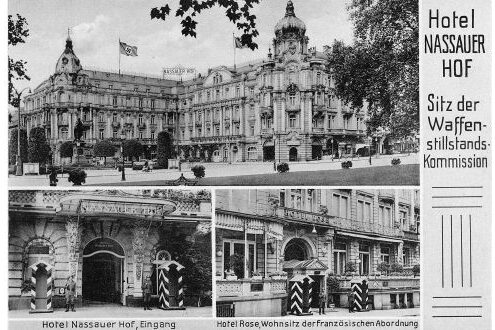German Armistice Commission 1940-1944
The German Armistice Commission, which met in Wiesbaden from 1940 to 1944, was tasked with clarifying all issues relating to the armistice between Germany and France.
Germany and France had been at war since September 3, 1939. Contrary to expectations, however, there was no military exchange of blows. The fighting only began on May 10, 1940, triggered by a German advance in the Ardennes. Within a few days, the French troops were overrun. The horrified civilian population fled southwards before the advancing Germans, and the government did the same. It left Paris and took up quarters first in Bordeaux and later in the spa town of Vichy (hence the name "Vichy government").
In addition, a new head of government was appointed on June 16, 1940, the "victor of Verdun", Marshal Philippe Pétain (1856-1951), who was generally popular and admired in France. His task was to ensure that France remained a sovereign state. However, this could only be achieved if hostilities with Germany ceased without France surrendering.
For this reason, the French government inquired about the German conditions for an armistice. Once it was clear that the Reich was prepared to refrain from appointing a German administrator for France, a very important condition for the French to sign an armistice, the treaty was signed on June 22, 1940 in the clearing of Rethondes, near the small town of Compiègne, by Wilhelm Keitel (1882-1946), the head of the High Command of the Wehrmacht, and the French General Charles Huntziger (1880-1941).
Article 22 contained the following passage: "The implementation of the Armistice Treaty shall be regulated and supervised by a German Armistice Commission, which shall carry out its activities in accordance with the instructions of the German High Command." This meant that a special "military authority" had to be set up with the task of clarifying all issues relating to the armistice, be they of a military, political or economic nature.
After the armistice treaty came into force on June 25, 1940, the German Armistice Commission (DWStK) was set up, which was based in Wiesbaden and took up its duties on June 30, 1940. A French delegation, the Délégation Française auprès de la Commission Allemande d'Armistice (DFCAA), was assigned to the DWStK. It was responsible for receiving the instructions of the German Armistice Commission and passing them on to the French government, which had to ensure that they were implemented. Conversely, the DFCAA served as a point of contact for the leadership of the "Etat Français", as "Vichy France" was officially known, to convey French wishes and demands to the Germans. The members of the DFCAA resided in the Hotel Rose in Wiesbaden, while those of the German Armistice Commission were mainly accommodated in the Hotel Vier Jahreszeiten and Nassauer Hof. The commission meetings were also held in the ballroom of the Nassauer Hof.
The DWStK consisted of military personnel (officers, non-commissioned officers and enlisted men), civil servants and civilian employees who liked to enjoy Wiesbaden's nightlife, provided it was not disturbed by air raids. They frequented the local restaurants, for example the Café Maldaner or the "Köhler" inn in Sonnenberg, and went on regular company outings to the surrounding area, such as to the Rheingau or Frankfurt am Main.
The DWStK, which existed as a relatively large authority in Wiesbaden until 1944, when it was reduced to 15 men and relocated to Vilsbiburg in Lower Bavaria, was initially headed by General Karl Heinrich von Stülpnagel (1886-1944), who was succeeded in February 1941 by General Oskar Vogl (1881-1954), who remained in office until September 1944. The two German generals were succeeded on the French side by Generals Charles Huntziger, Jean Louis Humbert (1895-1975), Paul Doyen (1881-1974), Etienne Paul Beynet (1883-1969) and Louis Bérard (1886-1968).
Literature
- Deutsche Waffenstillstandskommission
Festzeitung der Deutschen Waffenstillstandskommission Wiesbaden 1941 aus Anlass des Kameradschaftsabends des Unterstabes im November, Wiesbaden 1941.
- Lieb, Peter
Conventional war or Nazi worldview war? Warfare and the fight against partisans in France 1943/44, Munich 2007.
